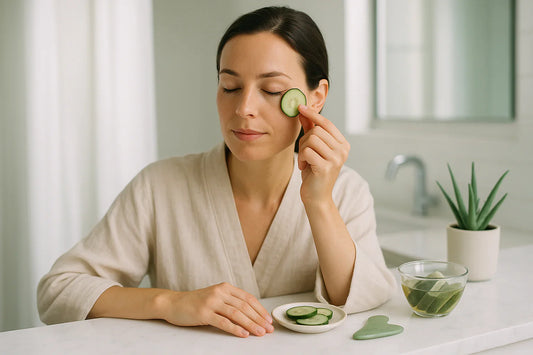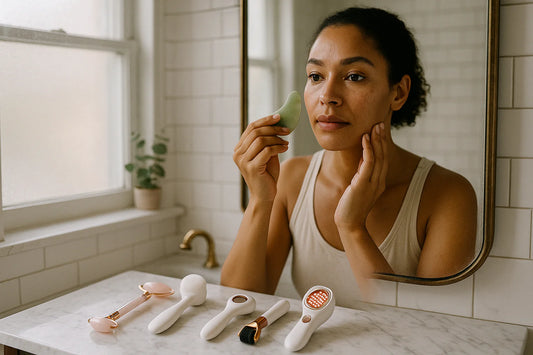Get your package anywhere!

Natural Ways to Boost Collagen for Younger-Looking Skin
Did you know that collagen production naturally decreases by about 1% each year after age 25? This essential protein makes up 75% of your skin's structure, yet most people don't realize how much control they have over maintaining it. The secret lies in understanding that your daily choices—from what you eat to how you sleep—directly impact your skin's ability to stay firm, smooth, and youthful.
Table of Contents
- Understanding Collagen and Its Role in Skin Health
- Essential Nutrients and Foods for Collagen Production
- Lifestyle Changes That Boost Collagen Naturally
- Proven Natural Skincare Ingredients
- Natural Supplements and Herbal Support
- Preventing Collagen Breakdown
- Myths & Facts About Natural Collagen Boosting
- FAQ
Understanding Collagen and Its Role in Skin Health
Collagen is the most abundant protein in your body, acting as the scaffolding that keeps your skin firm, plump, and elastic. Think of it as the foundation of a building—without strong collagen, your skin loses its structural integrity, leading to fine lines, wrinkles, and sagging.
Your body produces several types of collagen, but Type I collagen (found in skin, bones, and tendons) and Type III collagen (supporting skin elasticity) are most crucial for maintaining youthful skin. The production process involves amino acids like glycine, proline, and hydroxyproline combining to form collagen fibers.
Unfortunately, collagen synthesis begins declining in your mid-20s at a rate of approximately 1% per year. External factors like UV exposure, pollution, smoking, and poor nutrition accelerate this breakdown, making it essential to support your body's natural collagen production.
"The key to maintaining collagen isn't just about what you apply topically—it's about supporting your body's internal collagen factory through proper nutrition, lifestyle habits, and consistent skincare practices."
| Collagen Type | Primary Function | Skin Benefits |
|---|---|---|
| Type I | Structural support | Firmness, strength |
| Type III | Elasticity support | Flexibility, bounce |
| Type IV | Barrier function | Smooth texture |
Essential Nutrients and Foods for Collagen Production
Your diet plays a fundamental role in collagen synthesis. Vitamin C is absolutely essential—it acts as a cofactor in collagen formation. Without adequate vitamin C, your body simply cannot produce quality collagen fibers.
Protein-rich foods provide the amino acid building blocks your body needs. Focus on:
- Bone broth: Rich in collagen peptides and glycine
- Wild-caught fish: Provides marine collagen and omega-3s
- Grass-fed meats: High-quality protein and zinc
- Eggs: Complete amino acid profile
- Legumes: Plant-based protein and fiber
Vitamin C powerhouses include citrus fruits, berries, bell peppers, and leafy greens. Don't overlook zinc and copper—found in nuts, seeds, and shellfish—which are essential cofactors in collagen production.
| Food Category | Key Nutrients | Best Sources |
|---|---|---|
| Vitamin C Foods | Ascorbic acid | Citrus, berries, peppers |
| Protein Sources | Amino acids | Fish, poultry, eggs |
| Antioxidant Foods | Polyphenols | Green tea, berries, dark leafy greens |
Lifestyle Changes That Boost Collagen Naturally
Quality sleep is when your body performs most of its repair work, including collagen synthesis. During deep sleep, growth hormone levels peak, triggering cellular repair and regeneration. Aim for 7-9 hours of consistent, quality sleep.
Regular exercise increases blood flow and delivers nutrients to skin cells while promoting collagen production. Both cardiovascular exercise and strength training have been shown to support skin health and collagen maintenance.
Stress management is crucial—chronic stress elevates cortisol levels, which directly breaks down collagen. Consider incorporating meditation, yoga, or other stress-reduction techniques into your daily routine.
Hydration supports cellular function and helps maintain skin plumpness. While drinking water alone won't boost collagen, proper hydration supports overall skin health and the delivery of nutrients to skin cells.
"After incorporating daily yoga, better sleep habits, and consistent use of my high-frequency device, I noticed my skin looked firmer and more radiant within 6 weeks. The combination approach really works!"
— Maria K., HighWand Customer
Proven Natural Skincare Ingredients
Vitamin C serums are scientifically proven to stimulate collagen production when applied topically. Look for stable forms like magnesium ascorbyl phosphate or ascorbyl glucoside for sensitive skin.
Retinoids (vitamin A derivatives) are gold-standard ingredients for collagen stimulation. If you prefer gentler alternatives, bakuchiol offers similar benefits without irritation.
Natural collagen-boosting ingredients include:
- Peptides: Signal skin to produce more collagen
- Niacinamide: Supports collagen synthesis and skin barrier
- Hyaluronic acid: Plumps skin and supports collagen structure
- Plant extracts: Green tea, rosehip, and gotu kola
For enhanced results, consider professional-grade at-home devices like the HighWand Youth™, which uses advanced technology to stimulate collagen production at the cellular level.
Natural Supplements and Herbal Support
Collagen supplements can support your body's natural production, though results vary by individual. Look for hydrolyzed collagen peptides with types I and III for skin benefits. Marine collagen is often considered more bioavailable than bovine collagen.
Vitamin C supplements ensure adequate levels for collagen synthesis, especially if your diet lacks sufficient sources. Silica, found in bamboo extract, supports collagen cross-linking and skin elasticity.
Traditional herbs with collagen-supporting properties include:
- Gotu kola: Stimulates collagen production and wound healing
- Horsetail: High in silica for skin structure
- Astragalus: Antioxidant protection and cellular support
- He shou wu: Traditional anti-aging herb in Chinese medicine
Always consult with a healthcare provider before starting new supplements, especially if you take medications or have health conditions.
Preventing Collagen Breakdown
Sun protection is the most critical factor in preventing collagen degradation. UV rays activate enzymes called matrix metalloproteinases (MMPs) that break down collagen. Use broad-spectrum SPF 30+ daily, even indoors.
Avoid smoking—it depletes vitamin C, reduces oxygen delivery to skin cells, and accelerates collagen breakdown. Limit sugar intake, as excess glucose can cause collagen fibers to become stiff and brittle through a process called glycation.
Antioxidant protection helps neutralize free radicals that damage collagen. Incorporate antioxidant-rich foods and skincare products containing vitamins C and E, polyphenols, and other protective compounds.
Myths & Facts About Natural Collagen Boosting
-
Myth: Topical collagen creams directly add collagen to your skin.
Fact: Collagen molecules are too large to penetrate skin; peptides and ingredients that stimulate production are more effective. -
Myth: You need expensive treatments to boost collagen.
Fact: Simple lifestyle changes like proper nutrition, sleep, and sun protection make significant differences. -
Myth: Collagen supplements work immediately.
Fact: Results typically appear after 8-12 weeks of consistent use, as collagen renewal is a gradual process. -
Myth: Only older people need to worry about collagen.
Fact: Collagen production starts declining in your mid-20s, making prevention crucial at any age.
FAQ
How long does it take to see results from natural collagen boosting methods?
Most people notice improvements within 6-12 weeks of consistent natural methods. Skin cell turnover takes about 28 days, so patience and consistency are key for visible results.
Can you rebuild collagen naturally after age 40?
Yes, but it requires more effort. While production slows with age, proper nutrition, targeted skincare, and lifestyle changes can still stimulate new collagen formation and protect existing stores.
Which foods are most effective for boosting collagen production?
Bone broth, citrus fruits, leafy greens, and fatty fish are among the most effective. Focus on vitamin C-rich foods and high-quality proteins for best results.
How can I prevent collagen breakdown in my skin?
Daily sunscreen use, avoiding smoking, limiting sugar, and using antioxidant skincare are the most important prevention strategies.
Are natural methods as effective as cosmetic procedures?
Natural methods work more gradually but offer sustainable, long-term benefits. They're excellent for prevention and mild improvement, while procedures provide more dramatic, immediate results.
What's the best age to start focusing on collagen support?
Prevention should start in your 20s, but it's never too late to begin. The earlier you start, the better you can maintain your natural collagen levels.
Boosting collagen production naturally requires a comprehensive approach combining proper nutrition, healthy lifestyle habits, and effective skincare. While results take time, these methods offer sustainable benefits for long-term skin health. Consider incorporating advanced at-home treatments like the HighWand Youth™ to enhance your natural collagen-boosting routine. For more information on skin health and collagen, visit the American Academy of Dermatology.

More skincare tips
View all-

Natural Remedies to Minimize Puffiness Around t...
Over 70% of adults deal with eye puffiness, often making them look tired even after a full night’s sleep. Whether from allergies, habits, or genetics, natural remedies like cold therapy,...
Natural Remedies to Minimize Puffiness Around t...
Over 70% of adults deal with eye puffiness, often making them look tired even after a full night’s sleep. Whether from allergies, habits, or genetics, natural remedies like cold therapy,...
-

Choosing the Right Skincare Tool for Your Skin ...
Skincare tools in 2025 can be overwhelming—and 73% of beauty lovers admit they’re confused about what really works. The wrong pick can waste money and irritate skin, while the right...
Choosing the Right Skincare Tool for Your Skin ...
Skincare tools in 2025 can be overwhelming—and 73% of beauty lovers admit they’re confused about what really works. The wrong pick can waste money and irritate skin, while the right...
-

Why Does One Side of My Face Have More Acne? 7 ...
Asymmetrical acne—when one side of your face breaks out more than the other—affects most acne-prone people. Hidden triggers like sleep position, phone use, or hair products often fuel the imbalance....
Why Does One Side of My Face Have More Acne? 7 ...
Asymmetrical acne—when one side of your face breaks out more than the other—affects most acne-prone people. Hidden triggers like sleep position, phone use, or hair products often fuel the imbalance....
Satisfied or refunded
Free returns within 60 days
We are available 24/7
Contact us by chat, mail, phone
100% Secure payments
Visa, Mastercard, Amex, PayPal
We deliver worldwide
Get your package anywhere!
Satisfied or refunded
Free returns within 60 days
We are available 24/7
Contact us by chat, mail, phone
100% Secure payments
Visa, Mastercard, Amex, PayPal
- Choosing a selection results in a full page refresh.
- Opens in a new window.




